|
Brief term,
significant steps Dingiri
Banda Wijetunga, who was Prime Minister at the time of President
Ranasinghe Premadasa’s assassination, was elected by Parliament
to succeed the slain leader as President in 1993. He thus became
the first Executive President to be elected by Parliament.
Although President Wijetunga took up the mantle of leadership at
a time of catastrophe, he brought about a peaceful transition of
power and returned stability to the nation. During his short
tenure as President, he oversaw the removal of several irritants
that had earlier divided various sections of the people.
During his first six months in office, President Wijetunga
instituted measures to consolidate and carry forward the
economic development programmes that had re-oriented the country
towards a market economy since 1977. He also moved to modify
certain programmes to make them more productive and cost
effective.
President Wijetunga gave a high priority to programmes for
poverty alleviation, education, employment generation, and a new
impetus to agricultural development. He also took measures to
attract foreign investment and advance technology with the goal
of making Sri Lanka a Newly Industrialised Nation by the turn of
the 21st Century. Certain welfare measures curtailed earlier
were reintroduced during this period by President Wijetunga. |
Dingiri Banda Wijetunga - the journey to greatness
M.B. Dassanayake
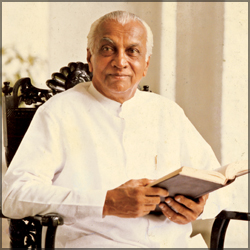 “Do
not be afraid of greatness, Some men are born great, Some achieve
greatness, “Do
not be afraid of greatness, Some men are born great, Some achieve
greatness,
And some have greatness thrust upon them.”
“Once to every man and nation comes the moment to decide In the
strife of Truth and Falsehood, for the good and evil side.”
Dingiri Banda Wijetunga was appointed Prime Minister in 1989 by
President Premadasa which was a surprise to the country. Wijetunga who
had never sought the limelight or high office, himself reacted with
surprise to the announcement.
He also held the Ministries of Finance and Labour and Vocational
Training in addition to being the State Minister of Defence in the
Premadasa administration.
At the untimely death of President Premadasa, by the unanimous
decision of (members of Parliament - both Government and Opposition) he
was appointed third Executive President of the Democratic Socialist
Republic of Sri Lanka to serve the rest of President Premadasa’s term.
He retained his previous portfolios (Finance and Labour) and took over
the ministries President Premadasa held (Defence, Buddha Sasana,
Education and Higher Education).
Early life
Wijetunga’s chequered life having his beginnings in an ordinary
up-country village family without the command of a clan or class power
or the attraction or prestige of economic or social assets, is known to
everyone.
|
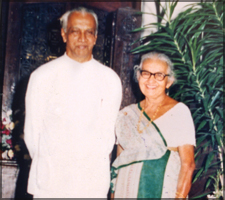
President D.B. Wijetunga with his wife |
He started his life almost in the manner of any ordinary man would
do, with all the disadvantages in life posing a challenge.
If he wanted to gain anything, any education, a job, a place in
society etc., he had to work hard and by his own dint of hard work
realised it.
There was no one to offer him such rewards on a golden platter.
Perhaps, it is this quality that finally moulded his character and
shaped its selective philosophy. What he learned in the formal way was
epitomised by him, by his own effort based on his own experience.
Wijetunga has seen the rise and fall of governments elected with
overwhelming majorities.
“Do not be afraid of greatness, Some men are born great, Some achieve
greatness, And some have greatness thrust upon them.”
These were the farewell words of Prime Minister Wijetunga who
addressed his colleagues in Parliament in a speech following his
unanimous appointment as the country’s third Executive President.
Wijetunga was born on February 15, 1922 to a middle class Sinhala
Buddhist family living on the outskirts of the then Udunuwara
electorate. On completion of his secondary education he joined the
Co-operative Department as an Inspector.
He closely associated with veteran politicians like George E. de
Silva and A. Ratnayake.
|
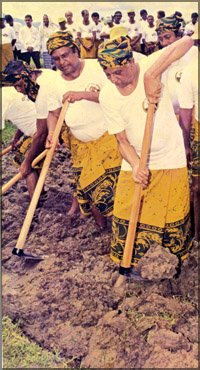
At a vap magula |
|
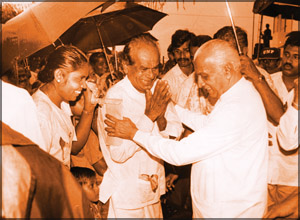
With constituents |
|
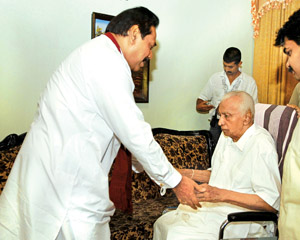
With President Mahinda Rajapaksa |
|
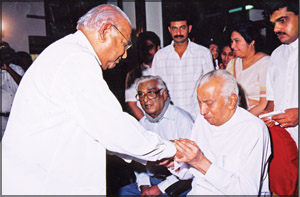
With Prime Minister Ratnasiri Wickramanayaka |
A. Ratnayake who was then Minister of Food and Co-operatives in the
D.S. Senanayake Cabinet took him as his Private Secretary. He joined the
United National Party in 1946. He entered Parliament for the first time
when he successfully contested the Udunuwara seat at the 1965 general
election and quickly made a reputation for himself as a fine
constituency member of Parliament ever mindful of the needs of his
electors.
In terms of meeting the needs of his constituents, he was considered
the most effective MP in that Parliament.
He lost Udunuwra in 1970 and was returned in 1977 UNP, landslide,
being appointed Minister of Information and Broadcasting in the J.R.
Jayewardene administration.
He later served the same administration as Minister of Posts and
Telecommunication, Minister of Power and Highways and Minister of
Agricultural Development.
He served briefly as the Governor of North Western Province in 1988
before returning to Parliamentary politics a few months later. In the
last General Election he contested.
Dingiri Banda Wijetunga, grassroots Kandyan who always saw to the
welfare of the Kandyan peasantry and was a very popular politician
scored the largest number of votes in the Central Province.
Historic Udunuwara, the stronghold of President Dingiri Banda
Wijetunga covers scenery so varied as to include ravines and streamlets
and acres and acres of sparkling paddy-fields vanishing into the purple
distant mountains.
Backward villages in the Udunuwara electorate were provided with
roads and neglected roads repaired enabling far-flung villages access to
development and modern amenities. With the assistance of officials and
with the co-operation of constituents he implemented several schemes for
the development of Udunuwara.
Within Udunuwara are four ancient and historic devales, viz,
Lankatilleke, Gadaladeniya, Embekke and Wallahagoda. In the past, these
Devales were neglected and needed the attention of the Archaeological
Department. As Member of Parliament for Udunuwara, with the assistance
of the Basnayake Nilames who made representations he forged ahead to get
these devales renovated, monuments and frescoes maintained.
He was a devout Buddhist who wanted to preserve the country’s
cultural traditions.
|

